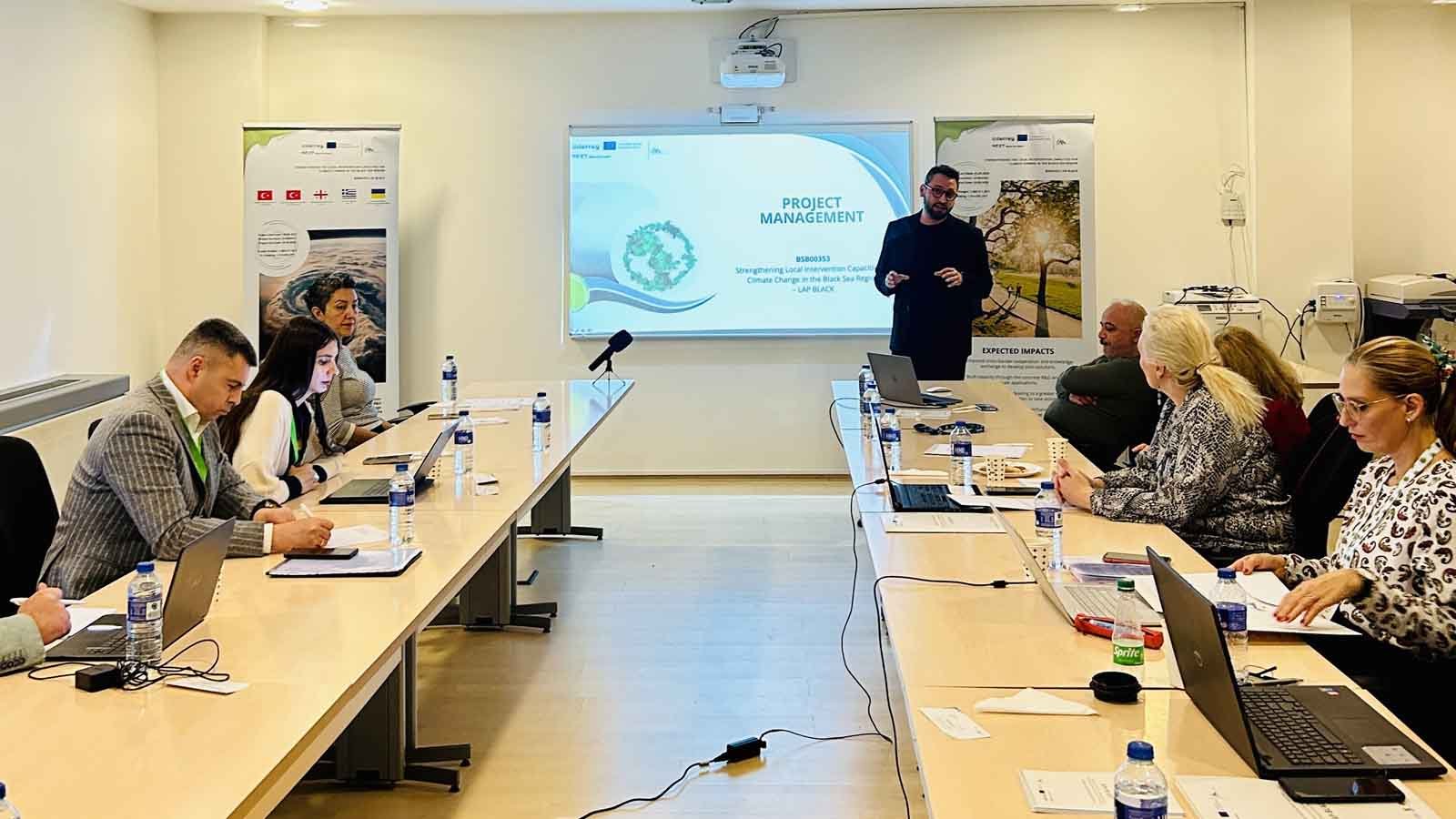The Strengthening the Local Intervention Capacities for Climate Change in the Black Sea Region Project is being implemented within the framework of the Interreg NEXT Black Sea Basin Cross-Border Cooperation Program, with the European Union Presidency serving as the National Authority.
Unfortunately, the Black Sea Basin is also being affected by the global climate changes. The climate in the region is gradually shifting towards the typical Mediterranean warm, dry climate, and extreme weather events such as increased sudden rainfall are occurring. These changes pose a serious threat to health, agriculture, ecosystems, and therefore regional economies. There is an urgent need to create effective adaptation plans to address these issues. Based on this scenario, the details of the “Strengthening the Local Intervention Capacities for Climate Change in the Black Sea Region Project” were shared with the public at a press conference held in Istanbul, with the participation of the project partner institutions.
International cooperation and experience sharing are vital in addressing the environmental issues in the Black Sea Basin. The “Strengthening the Local Intervention Capacities for Climate Change in the Black Sea Region Project” is being implemented by a consortium formed under the coordination of Istanbul Technical University (ITU), in collaboration with Sakarya Metropolitan Municipality, Kavala Municipality (Greece), Mykolaiv Municipality/Ukraine Business Support Centers Association (Ukraine), and Kobulety Municipality (Georgia). The project, which will last for 24 months, brings together experts to share best practices and develop innovative solutions to climate change and environmental issues.

The project aims to increase intervention capacities against climate change.
The project focuses on examining the impacts of climate change in the Black Sea Basin and enhancing local-level intervention capacities. As the lead partner of the consortium, Istanbul Technical University (ITU) will conduct R&D activities and guide other partners in their climate change adaptation processes. The project’s goals include:
Increasing awareness by involving relevant stakeholders in the adaptation processes.
Creating Local Adaptation Plans for the local governments involved in the consortium,
Identifying and prioritizing strategies that can be implemented locally to reduce climate change impacts,
Establishing a continuous improvement infrastructure for the monitoring and evaluation of local adaptation plans,

A Sustainable Park Application will be implemented as part of the project. The activities in the project will be supported by pilot-scale applications. In this context, partner municipalities will construct Sustainable Parks as a pilot application. These parks will serve as living laboratories for the implementation and testing of climate-resilient infrastructures, green spaces, and sustainable practices. The Sustainable Parks will host renewable energy and environmentally friendly applications and will continue to be used under the responsibility of the partner municipalities after the project’s completion.
The goal is to enhance resilience to the impacts of climate change in the medium and long term, implement sustainable land-use planning practices, and adopt effective water management strategies.
“The main goal of this project is to create Local Adaptation Programs,” stated Associate Professor Dr. Ömer Ekmekçioğlu from the Disaster Management Institute at Istanbul Technical University, who is overseeing the coordination of the project. During the press conference, he discussed the effects of climate change on the Black Sea Basin and summarized the project’s objectives as follows:
“The fundamental goal of this project is to create Local Adaptation Programs that will be used as a long-term guide for combating climate change in the Black Sea Region. The project aims to strengthen local governments’ intervention capacities against the effects of climate change, increase the resilience and sustainability of infrastructures, and enhance the adaptation capacities of local communities. In this context, awareness about the importance of climate change impacts and adaptation measures will be raised, and cooperation and information sharing among local governments, citizens, and other stakeholders will be encouraged. Additionally, through example applications like the design of sustainable parks, environmental impacts will be minimized, societal welfare will be supported, and economically sustainable solutions will be offered.
The project will ensure the continuous monitoring, evaluation, and updating of adaptation plans to maintain the effectiveness of climate change adaptation strategies. Aiming to contribute to the long-term goals of the Paris Agreement, the project will strengthen resilience to climate change by reducing vulnerabilities in the region and supporting sustainable development. Lastly, this project is expected to assist decision-makers and policy-makers in shaping relevant legislation and foster a regional transformation by encouraging the adoption of long-term, sustainable practices in the Black Sea Region against climate change.”

About the Interreg NEXT Black Sea Basin Programme
The Interreg NEXT Black Sea Basin Programme is financed by the European Regional Development Fund (ERDF), The Neighbourhood, Development and International Cooperation Instrument (NDICI), and the Instrument for Pre-accession (IPA) within the framework of the European Neighbourhood and Integration Policy. The cooperation area of the program covers the entire or part of the territories of seven countries: 3 EU member states (Bulgaria, Greece, Romania) and 4 non-EU countries (Georgia, Moldova, Turkey, Ukraine).

Project Title
Karadeniz Bölgesinde İklim Değişikliğine Yönelik Yerel Müdahale Kapasitesinin Güçlendirilmesi
Strengthening The Local Intervention Capacities for Climate Change in the Black Sea Region
Project Partner Name
İstanbul Teknik Üniversitesi
İstanbul Technical University
Project Partner Contact Details
Phone: +90 212 285 65 32
Email: omer.ekmekcioglu@itu.edu.tr

































